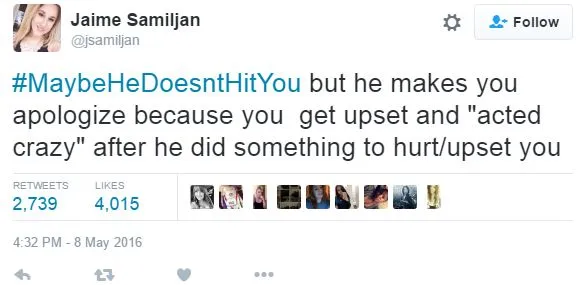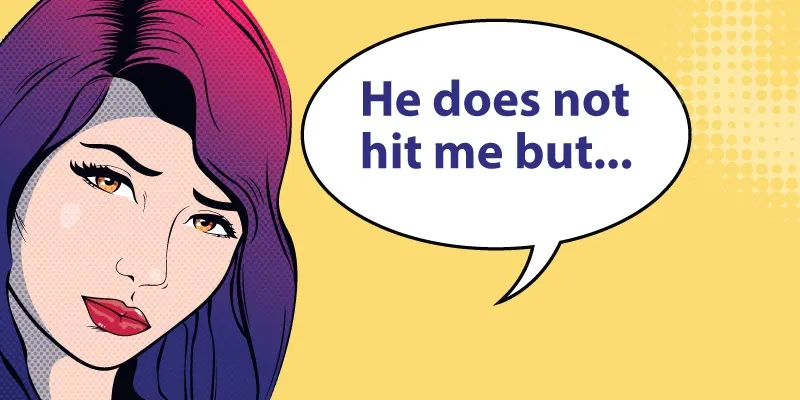#MaybeHeDoesntHitYou on Twitter has got women opening up on emotional abuse
The hashtag #MaybeHeDoesntHitYou was recently started by Dominican-American writer Zahira Kelly, who had no idea it would start trending around the world. She told BBC that she started the hashtag to help victims of emotional abuse identify red flags in their relationships.




Psychological abuse (also referred to as psychological violence, emotional abuse, or mental abuse) is a form of abuse, where the abuser subjects the victim to behaviour that could lead to poor self-esteem and even psychological trauma, including anxiety or chronic depression, in the long run. Though both men and women can be victims of emotional abuse, due to financial dependency and prevalent patriarchal customs in India, it is mostly women who are the victims of all kinds of abuse.
Emotional abuse, unlike physical and sexual abuse, is often not recognised by the victims as abuse. Additionally, research shows that victims of emotional abuse tend to exhibit higher rates of alexithymia – which is difficulty in identifying and processing their own emotions. Not recognising their experience as abuse can be the victims’ coping or defence mechanism to endure stress or conflict.

How can you identify an emotionally abusive person among your friends or family?
- They humiliate their partner and constantly demean them in social settings.
- They disregard others’ opinions or needs.
- They control their partner and treat them like a child.
- They use sarcasm or ‘teasing’ to undermine their partner’s feelings.
- They accuse others of being ‘too sensitive’ when called out on their hurtful behaviour.
- They behave like they are always right, and others are wrong.
- They threaten to hurt or kill themselves if their partner confronts them or tries to end the relationship.
- They frequently express contempt for their partner through looks or body language.
- They are incapable of laughing at themselves and cannot tolerate others laughing at them.
- They are intolerant of any seeming lack of respect.
- They make excuses for their behaviour, try to blame others, and have difficulty apologising.
- They resort to sulking or withdrawal to gain attention or get what they want.
- They withhold affection or sex as a way to manipulate and control.
- They share personal information about their partner with others.
- They apologise and promise to change to gain the partner’s trust and then revert to abusive behaviour.
If you are not sure you are in an emotionally abusive relationship, the questions you need to ask yourself are
- Do you feel that you cannot be frank with your partner?
- Does your partner frequently criticise or humiliate you?
- Does your partner isolate you from friends and family?
- Does your partner limit your access to money?
- Does your relationship swing between extreme emotional distance and closeness?
- Have you ever felt pressurised to have sex?
- Do you feel trapped in the relationship?
- Are you scared of your partner?
If you feel you are in an emotionally abusive relationship, what should you do?
Take care of yourself first
Stop trying to please or protect the abuser. Take care of yourself and your needs, even when your partner sulks or tries to manipulate you and control your behaviour.
Set boundaries
Tell your partner that behaviour like yelling and name calling are off-limits. If the bad behaviour continues, walk out and stay with friends/ family, if convenient, till they agree to reasonable behaviour.
Don’t react
If your partner tries to provoke you or pick a fight, don’t react with anger or apologise in the interest of keeping peace. Just keep quiet and walk away instead of engaging.
Accept you might not ‘change’ them
Women often hope to change their abuser through their love and support. But fact is that it is not that easy to change an abusive person.
Don’t blame yourself
Manipulative people are adept at making you feel it’s your fault and that you deserve the treatment meted out. Do not blame yourself or allow your self-esteem to erode.
Get help
Don’t hesitate to ask for help. Talk to a trusted friend or family member about what you are going through. Convince your partner to go in for individual and couple counselling with a qualified therapist. Get away from the abusive person for a while, and spend time with those who love and support you. Your support system will help you feel less depressed and isolated.
It is also important to remember that differences of opinion or even conflict is natural in any relationship. If such differences are handled in a healthy and mutually respectful manner, it is not abuse and is not a cause for concern.







